Otura Pompey (Òtúrá Ìwòrì)

Otura Pompey (Òtúrá Ìwòrì), is Oddun number 199 in the Lordly Order of Ifá, tells the story of a dethroned Queen who, after overcoming great adversity, was finally restored to her throne. This return not only restored her happiness to her people, but also reaffirmed the principle that her righteous actions eventually receive their well-deserved reward.
Analysis and Reflection of the Odu Òtúrá Ìwòrì
Otura Iwori is an Odu that requires introspection and prudence. Those ruled by this Ifa sign must avoid impulsiveness and act with moderation to ensure that the opportunities that arise can be fully taken advantage of. Otura Iwori warns about the dangers of arrogance and stubbornness, urging his followers to listen to and follow Orunmila's advice to obtain protection and guidance in their lives.
The stubbornness of the Awó ultimately leads to his death.
Economic Aspects:
On an economic level, Otura Iwori points out that you should not accept the first offer that comes your way, suggesting that patience and detailed analysis can lead to better business opportunities or more beneficial agreements. This sign also speaks of transformation and renewal, which may indicate a favorable period to start new projects or renew existing ones, as long as the appropriate sacrifices are made and the rituals of purification and offering are followed, as indicated by Ifá practices. .
Health:
From a health point of view, this Odu predicts stomach, visual and memory problems. Followers are advised to avoid foods that may be difficult to digest or harmful, such as meat and eggs, and pay special attention to their diet and lifestyle habits to mitigate these problems. In addition, it is essential to perform adequate ebos to maintain balance and physical and mental health.
Religious Aspects:
Religiously, Otura Iwori is deeply connected to several deities, such as Elegua, who was crowned in the river, and Yemayá Asesu, a powerful manifestation of the Orisha of the sea who plays a significant role in this Odu. Performing specific offerings and rituals is crucial to maintaining a harmonious relationship with these Orishas and ensuring their favor and protection.
Personal Relationships (Love):
Regarding personal relationships, this sign warns of the potential for conflicts and misunderstandings caused by stubbornness and arrogance. Otura Iwori advises against domination and abuse of power within personal relationships, promoting the need for understanding, patience and mutual respect. The lessons of the dethroned Queen, who had to be reinstated for the happiness of her people, underline the importance of humility and the capacity for redemption and forgiveness in interpersonal relationships.
General Description of the Odu Òtúrá Ìwòrì (Otura Pompey)
Names or Aliases:
- Òtúrá Ìwòrì.
- Otura Pompey.
- Otura Wo.
- Otura Pompey.
What is born in the odu Otura Pompeyo?
- The guacalote and prepare an Ifá with them.
- Orunmila ordered the fish to make Ebbó and it did not want to. And since then man has been fishing for them.
- The person is stubborn.
- When this Oddun comes out, you have to open the water basin.
- There is a problem with memory, eyesight, and stomach.
- Talk about the dethroned Queen.
- Talk when the rooster was plucked on the corner.
- Eleguá was crowned in the river.
- The God of the mountain and the God of the city speak.
- The duck speaks.
- Yemayá Asezú reached his power.
- The dog paid with his head.
Recommendations:
- Do not act impetuously, as all good things are on the way.
- Do something to Oluopopo (Saint Lazarus) to treat skin rashes.
- Give mangy dog to Oluopopo.
- Give 5 Carmelite doves to Oshun to ward off death (Iku).
- Open the water sink, so that the water runs.
- Make a head of mud and water Ayo (Guacalote) grass on the floor, put a parrot feather on it and after the Iyoyé, give it to the Awó to make the first Ebó.
- When Awó sees this Ifá, take his Idefá, put it on the board doing Apayerú and hang it in the house.
- The Awó Otura Iwori must give his Ifá a tiger's fang and a lion's fang (Ekun and Kekun).
- Give duck blood to the person's head to erase all the bad things they have done and put them at the mercy of Olokun.
- I pray the head with fresh things after seven days.
- Put Yemaya Asesu in a basin full of sand, surrounded by ducks, in the middle is the jar that carries the head of the Ebo of Sodorisha and two wooden masks, loaded with the Osanyin.
- Elegua is put on a 9-color hat.
- Add pulverized sea sand to the Iyefá of this Odu of Ifá.
Prohibitions:
- You should never accept the first offer you are offered.
- Persuasion is prohibited.
- Eating meat and eggs is prohibited.
- Forbidden to go to the square.
- Do not accept to live again with the people who destroyed your home due to gossip or misunderstanding of your spouse's relatives.
You Might Also: Sign of Ifa Otura Meyi
Sayings of Otura Iwori:
- Do the words are gone with the wind.
- When you are stubborn, you lose yourself in life.
- Whoever sells to his friends, pays with his head.
"Do the words are gone with the wind" It reminds us of the fragility of unfulfilled promises and the importance of actions over words. This saying emphasizes that what we say must be backed by concrete actions, since words without actions are ephemeral and easily forgotten.
Says Ifa odu Otura Iwori:
You should avoid stubbornness, as it has led you to lose on multiple occasions. It is essential that you stop digging into corners, as it could affect his vision. Even if he is considering a loan or a financial offer, he thinks deeply because his heart is not really committed to it. If you are planning spiritual work to influence someone for financial reasons, remember that gratitude toward those who have helped you, such as a significant woman in her life, is essential.
When facing an emergency, feeding your head spiritually could be the key to overcoming it. Pay attention to people who approach you with dreams or advice, as one of them could be crucial to your future. Be cautious of legal matters and bad influences that could paradoxically prove beneficial. If you are facing challenges in your home, especially due to family conflict, avoid resuming cohabitation with those who contributed to the discord to preserve your well-being.
Maintain vigilance on the street to avoid attacks and be careful with possible skin diseases. Be sure to maintain a constant flow in your life, as opening the water stack symbolizes. Circulatory and reproductive problems also require your attention. Finally, protect your physical and mental integrity from possible spells or deceptions, and do not allow destructive thoughts to disturb your balance.
Meaning of the odu Otura Iwori:
This Ifá reveals that those who are governed by this Odu may experience stomach, vision and memory problems. They are characterized by their stubbornness, disobedience and tendency to boast; only Orunmila's guidance can save them if they decide to obey him, otherwise they will stray from their path.
These people often perceive themselves as strong and powerful, which can lead them to underestimate and abuse those who are most vulnerable. However, they must be careful, as those they underestimate could join in and pay them back.
The symbolism of the plucked rooster warns about the dangers of attracting enmity and the consequences of arrogant acts. In addition, it is urged to maintain vigilance on the street to avoid being a victim of attacks.
This Ifa sign highlights a significant moment in which Elegua crowned himself in the river, marking a point of transformation and spiritual renewal.
In this Odu, Yemaya Asesu is presented as the divinity closest to Olokun. Recognized as the lady of ducks, geese and swans, Yemaya Asesu inhabits places with stagnant water such as toilets and pipes, and carries the nickname "La Desmemoriada". Originally from the Odu Irete Odi, her connection with these aquatic elements reflects her deep connection with water.
Its image is associated with shades of light blue and soap water. A little drum, a handle and a whirlpool are offered to this orisha, while the Arará people venerate her under the name of Weijosu.
In the Odu Otura Iwori, Yemaya Asesu reaches a position of great power, being the inseparable daughter of Olokun and an Egun of significant influence. She is known for having broken all ties that bound her to the Earth and is symbolized by a duck, instead of the traditional rooster in her Osun, marking her victory and her autonomy.
Although it is said to be the only Yemaya that consumes duck, there is debate among the Babalawos, some of whom maintain that all forms of Yemaya, except Okute, include duck in their diet.
You Might Also: Oddún Iwori Turale
Prayer of the Odu Otura Iwori:
Otura Wori Yigui Diyi Pako Pako Adifafún Akukó Lorúbbo, Okó Oda Eyelé Iyá Lesari Otura Kopeku Iwori Kopeya Elegbá Komara Loda Larun Abbó, Ounkó Akukó, Ekú Lorúbbo Kaferefún Obbatalá Atí Olokún.
Ebboses (works) by Otura Pompey:
Work for memory
This ebo involves several elements and steps, designed to purify memory and encourage spiritual transformation. The necessary components include: a duck, a banana, a rooster, a chick, river water, white, black and blue cloth, a doll representative of the gender of the interested party, sea water, a variety of herbs, nine different adimú, water indigo, smoked jutía and fish, toasted corn, corojo butter, coconuts, candles, brandy, and specific ritual elements such as Oparaldó herbs, Oparaldó fabrics, cascarilla, and two white doves.
The process begins by kneeling the interested party on the bank of the river, where his head is scraped with scissors and a razor. Subsequently, he washes himself with omiero prepared from many herbs, followed by sea water and finally river water. During this process, the head is prayed with the rooster and the two white doves, allowing the blood to flow from the head to the river while the Súyere, a song used in head prayer in Ifá, is sung.
After this, the blood of the duck is applied to the head of the person concerned, symbolizing the elimination of all the negative accumulated in his earthly life and his surrender to the care of Olokún, which marks the beginning of a profound personal transformation. After seven days, his head is prayed again with fresh offerings (Bibikan Tutu).
If the white doves are part of the prayer, the banana and the rooster are offered to Yemayá. In addition, the nine addimú are placed next to nine candles and black cloth, and an obbi omí tutu (fresh coconut) is made. This entire set is carefully wrapped and taken to the sea. The chicken is offered to Oparaldó with its respective ingredients.
Ebo of Òtúrá Ìwòrì to Avoid Death by Tragedy
This ebbo, reflected in the sign Òtúrá Ìwòrì, seeks to protect the person concerned from dying due to tragedies. The process begins by taking the person to a place where brava reeds grow. Once there, a specific branch of the cane is selected, which is carefully bent downward so that the interested party can grasp its tip. This branch is then placed on the individual's navel and gently released.
After this, the bent branch is cut and prepared for the ebo, which will also include a rooster and other specific elements that Orunmila determines necessary. The rooster is preferably offered to Oshosi, placing it next to the branch, to which blood is applied to its lower part, thus ritualizing the offering.
Finally, it is crucial to consult Orunmila to determine the proper destination of the cane branch used in the ebo. This step ensures that the ritual is completed correctly, following Ifá guidelines to maximize the spiritual protection of the person concerned.
You Might Also: Ifa Obara She sign
Patakie of the sign Otura Iwori
Memory loss
In her youth, Yemayá Asesú was known for her festive spirit, which led her to neglect her obligations towards the Orishas. In a moment of illness, Asesú sought the help of Orunmila, who revealed to her that all the Orishas had turned their backs on her, except Olokún. Orunmila advised him to perform Ebbó and great ceremonies to reconcile with the spiritual world.
After the ceremonies, Asesú lost the memory of his past misdeeds and joined Olokún permanently. This transformation marked a radical change in her life, making her the favorite and inseparable daughter of Olokún and giving her a powerful Eggún. Breaking with her earthly alliances, Asesú dedicated himself completely to her new path, always relying on the guidance of her father Olokún.
This patakie highlights the uniqueness of Asesú within the Yoruba pantheon, being the only one of the Yemayá roads that eats duck and resides in a jar with an Osanyín. In this Odun, it is recommended to take Olokun from Babalawo to overcome difficulties and acquire additional power. Those who are already followers must offer a white ram to Olokún to solve problems.
Explanation: The story of Yemayá Asesú teaches us about the importance of responsibility and commitment in our spiritual and earthly relationships. Asesú learned that neglecting his duties had serious consequences and that only through an act of purification and transformation could he redeem himself. The moral highlights that redemption is possible through acceptance of our faults and dedication to correcting our mistakes, leading to a fuller life aligned with our true beliefs and duties.
The Deception of the Tiger and the Lion
The tiger and the lion, known for their acts of prey and violence towards other animals, lived together committing all kinds of evil. When their misdeeds were finally reported to Obatalá, he advised them to adopt more virtuous behavior, advice that they both ignored. Given the persistence of the complaints, the two went to Orunmila, who, after performing an Osodde and seeing the Odu Òtúrá Ìwòrì, he ordered them to do Ebbó and change their diet to corojo butter and cascarilla, in addition to appearing before Obatalá to clarify the accusations.
When appearing before Obatalá, the tiger and the lion claimed to be victims of slander, declaring that their diet was based solely on corojo butter and cascarilla. Obatalá, deciding to verify the veracity of their statements, detained them to observe their excrement, confirming that they were indeed consuming the mentioned foods. Convinced by this evidence, Obatalá released them and declared that he would not listen to future accusations, considering them innocent.
Explanation: This story illustrates how cunning and deception can manipulate the perception of truth. Although the tiger and the lion managed to deceive Obatalá temporarily, the text suggests a warning about truthfulness and the importance of seeing beyond appearances. The final note on the need to take care of your eyesight alludes to the ability to discern the reality behind the falsehoods presented. This story reminds us that, even in the face of seemingly conclusive evidence, we must be cautious and consider all possibilities before making a judgment.
Otura Pompeyo (Iwori) in Traditional Ifa
ÒTÚRÁ ÌWÒRÌ
ahonránmogángan
Ahónrànmogàngan
Ìbèrù ò jé á roko ìdí àgbon
Kó mó baà tibi hòrè hòrè bani lérù
A day fún Òrúkú Ònà Èyò
Tomo aráyé n pè lérú
bó bá báhìín
Won to Peru àwon ni
bo de òhún
Won to Peru àwon ni
À á séé mo Òrúkú Ònà Èyò?
N làá pe Sángó
Wón ní kó rbo
Wón ni wón ó da mò lomo nlée baba è
Sàngó bá rbo
Ló bá sàgbère lo
Títíítí kò dé
Ngbà ti or padà dé
N kùó sánmò
Ilé e baba è ló bèèrè
Kàràràràrà ló Sáàrá
Wéré won n pé ilée babaa rè rèé
Ilée babaa rè rèé
Àwon ò mò
À bá ti pè or lérú
Ní Sàngó wá n jó n ní n yò
Ní n yin àwon Babaláwo
Àwon Babaláwo n yin Ifá
Ó ní béè làwon bBabaláwo tòún wí
ahonránmogángan
Ahónrànmogàngan
Ìbèrù ò jé á roko ìdí àgbon
Kó mó baà tibi hòrè hòrè bani lérù
A day fún Òrúkú Ònà Èyò
Tomo aráyé n pè lérú
Wón ní ó saca káalè ebo ní ó se
Ó yes gbébo nbè
Ó rubo
Òrúkú Ònà Èyò tomo aráye n pè lérú
Omo délé baba è
Omó waá domo gidi.
Ifá prays so that this person does not get lost in life. Life will please him if he could be a devotee of Sàngó. He will settle in his father's house and be recognized.
ahonránmogángan
Ahónrànmogàngan
Fear caused one to stop weeding a coconut palm tree farm
Since the hoe being dragged to weed a farm generated a frightening noise
He was the one who made divination for Òrúkú Ònà Èyò
Whom man calls a slave
When he moves here
They would say 'He is our slave'
When he moves to the other side
People on the other side would say 'He is our slave'
How do we recognize Òrúkú Ònà Èyò?
He is one we call Sàngó
They advised him to make sacrifice
They assured him that they would recognize him, as a royal son in his father's house.
Sàngó made the sacrifice
He then left in search of power
He was not seen for a long time
On his return
He left the skies
He asked for his father's house from afar
In a loud crack produced by thunder
Immediately, they pointed their hands towards their father's house
'Here is your father's house'
'We were just ignorant from the beginning'
'We would never have called him a slave again'
Sàngó started dancing and was very happy
He was praising his Babaláwos
His Babaláwos were praising Ifá
He said it was as his Babaláwos had said
ahonránmogángan
Ahónrànmogàngan
Fear caused one to stop weeding a coconut palm tree farm
Since the hoe being dragged to weed a farm generated a frightening noise
He was the one who made divination for Òrúkú Ònà Èyò
Whom man calls a slave
They advised him to take care of the land and make the sacrifice
He heard about the sacrifice
And offered it
Òrúkú Ònà Èyò, whom man calls a slave
The son came to his father's house
And he became a legitimate and recognized son.
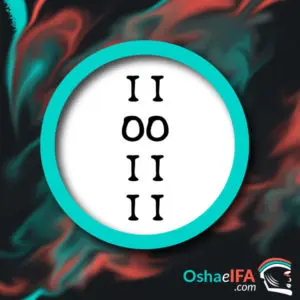

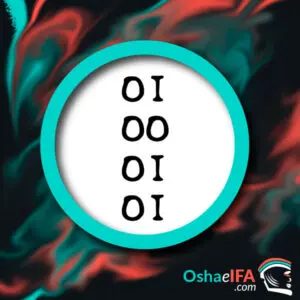
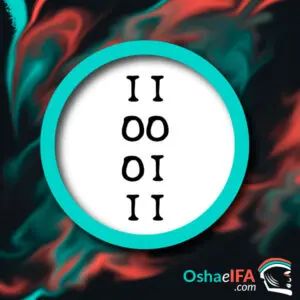
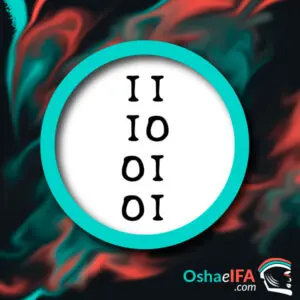
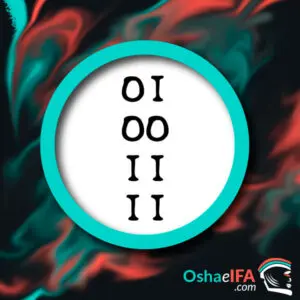
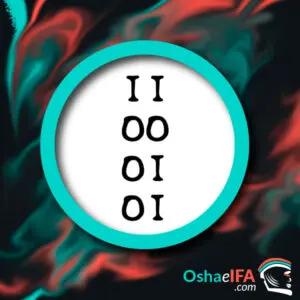

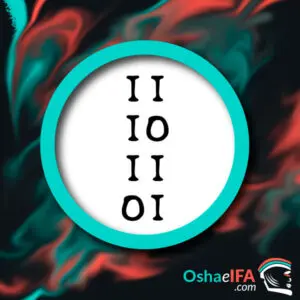
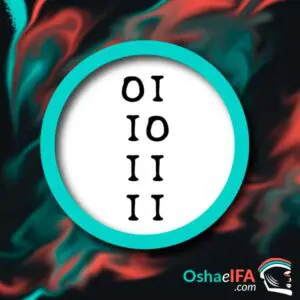
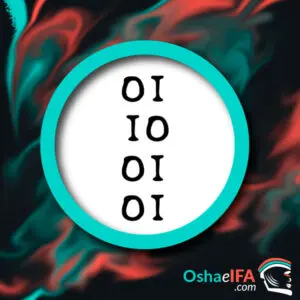
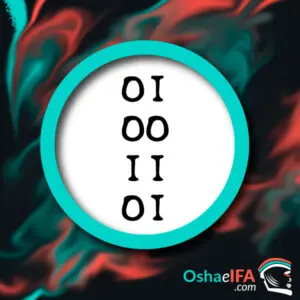



Grateful for the information. I would also like to know why they don't eat pork and eggs since there is no pataki that explains it. Elsewhere it says that there is no settlement. It is my orula hand sign and my guardian angel is oya. Greetings.
It's my sign too and I'm the son of an elegua.
It is my sign too and I am the daughter of Olokun